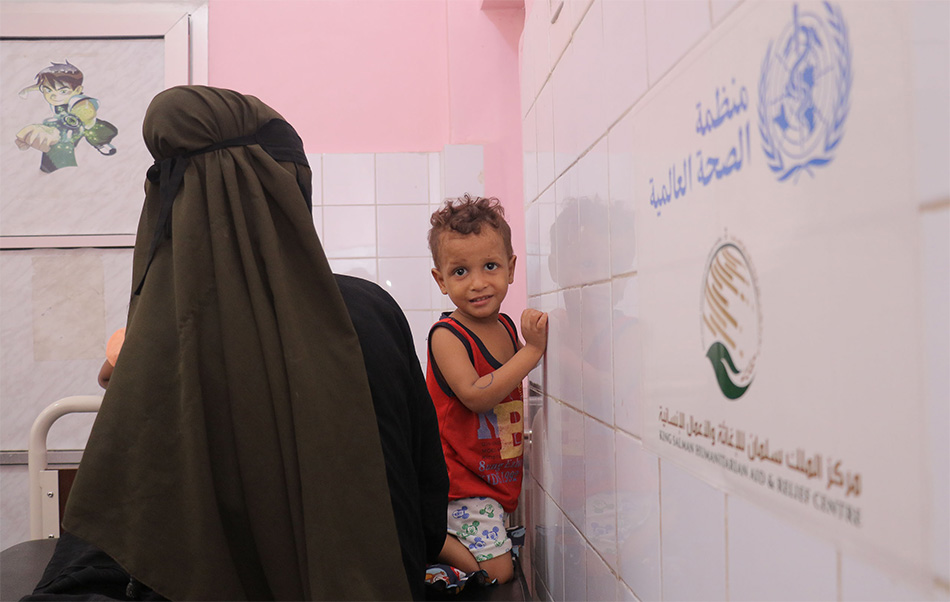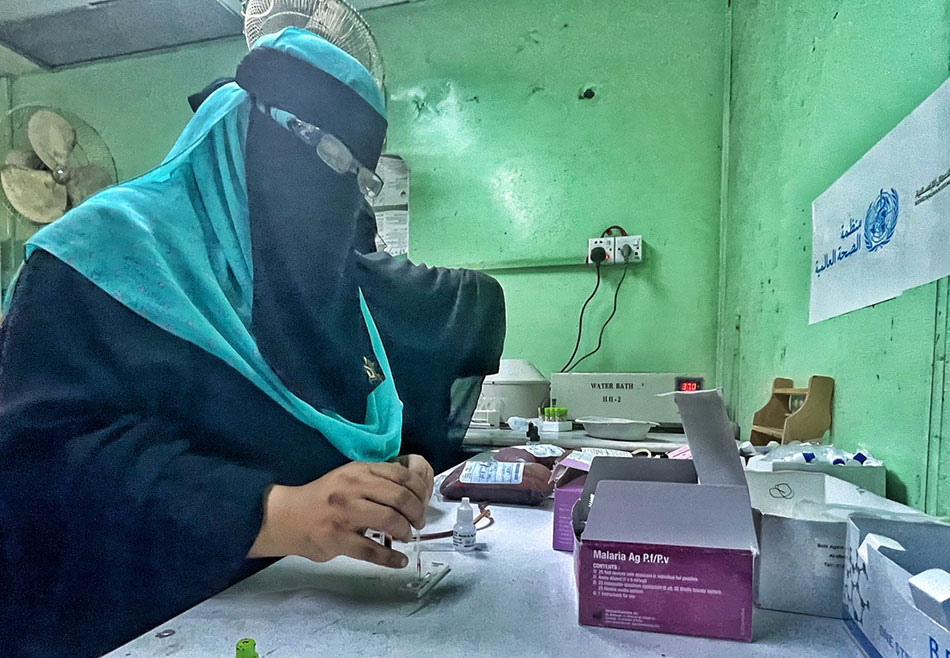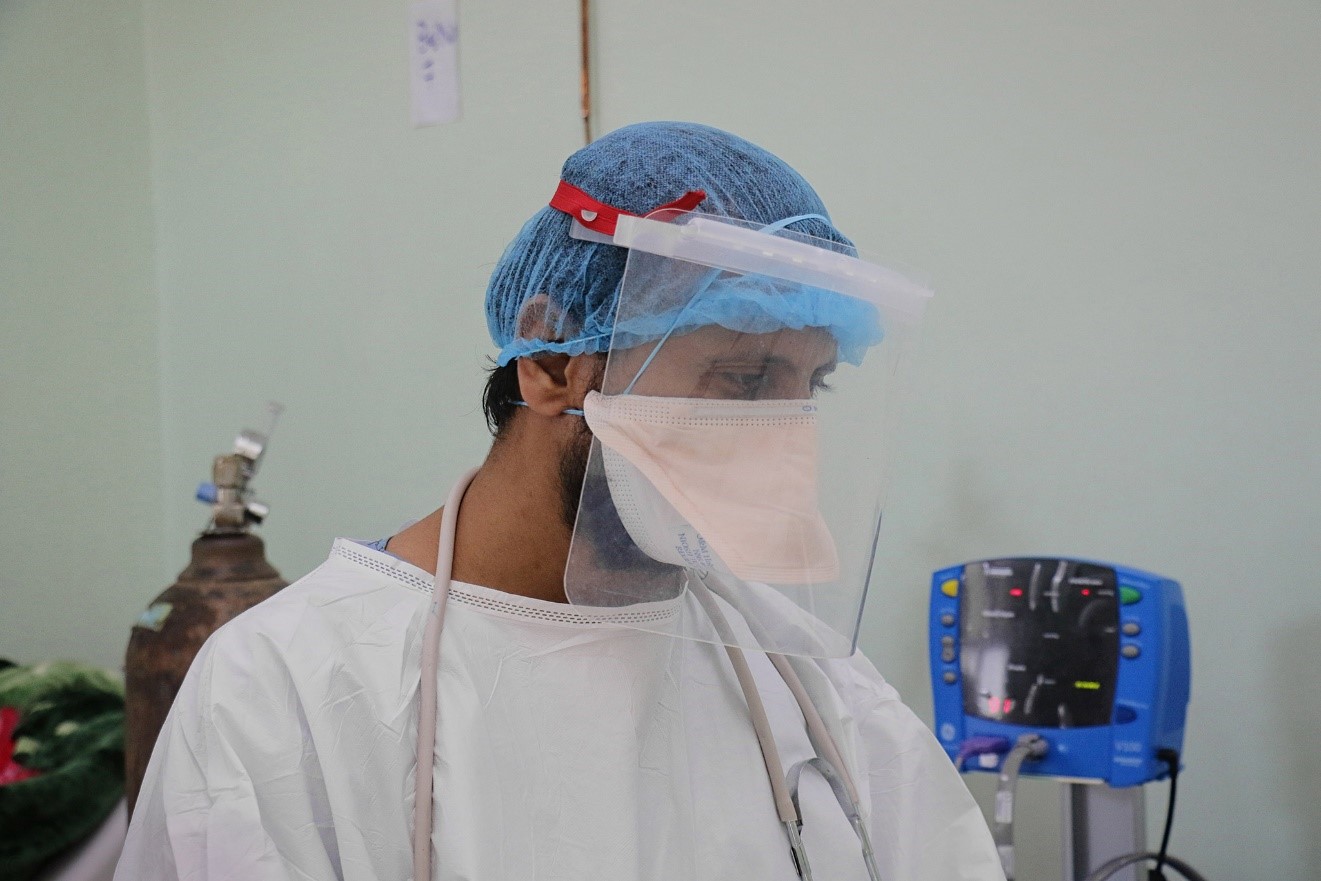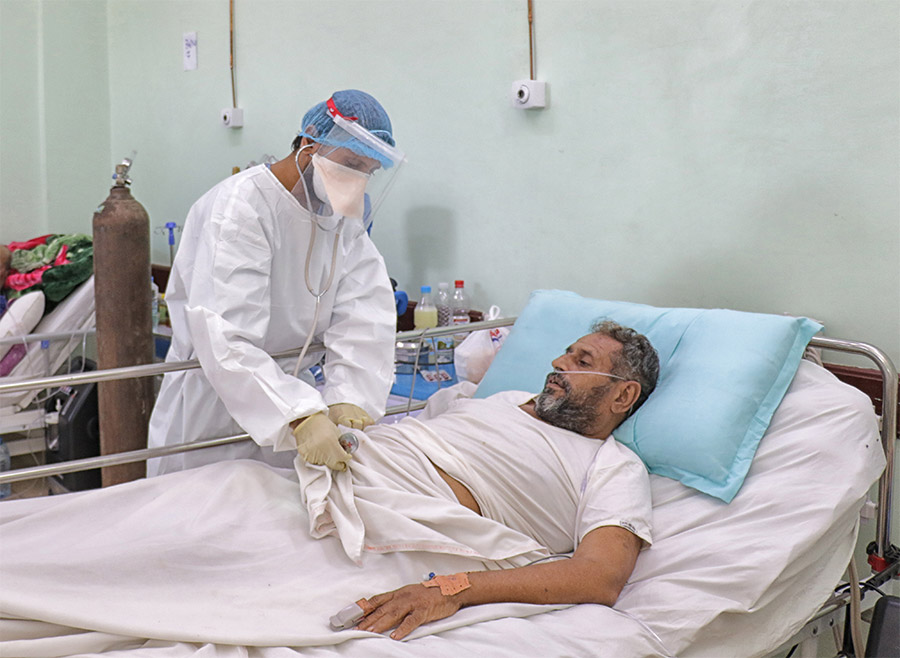New oxygen production stations to be constructed in Yemen
22 November 2021, Aden, Yemen - The World Health Organization (WHO) has joined efforts with the Islamic Development Bank (IsDB) Group and the Ministry of Public Health and Population to construct 14 new oxygen production stations that will save lives from the COVID-19 pandemic in Yemen.
The oxygen production stations, valued at over US$ 3.4 million, are being constructed in 11 southern governorates of Yemen and will be gradually put into operation between December 2021 and February 2022. The oxygen stations will be jointly managed and implemented by the Ministry of Public Health and Population and WHO, and are financed through a US$ 20 million loan from IsDB Group, as part of its Emergency Support for the COVID-19 Preparedness and Response Plan in Yemen. Through this support, the IsDB has also contributed to the substantial upgrading of operational capacities of 32 COVID-19 treatment centres and central public health laboratories across the country.
“The availability of uninterrupted oxygen supply is key to the survival of patients with severe cases of COVID-19 who otherwise face lung failure,” said Dr Adham Rashad Ismail Abdel Moneim, the WHO Representative in Yemen. “This is why the construction of these oxygen stations is one of the most important things we can do to save the lives of many more patients suffering from COVID-19.”
“Through this Project, the IsDB seeks to support the Republic of Yemen to overcome the humanitarian, social and economic difficulties that continue to threaten poverty alleviation efforts and disease control, particularly COVID-19,” said Dr Ilker Ersegun Kayhan, the IsDB Operations Team Leader for the Gulf Cooperation Council countries and Yemen.
“By increasing local capacity to produce medical oxygen, we can help to minimize COVID-19 morbidity and mortality rates in Yemen,” said Dr. Kayhan. “This is the first time that such a high number of plants will produce oxygen of medical grade, to support COVID-19 case management in partnership with the WHO, the Ministry of Public Health and Population, and the Ministry of Planning and International Cooperation.”
Yemen is facing urgent challenges in securing oxygen supplies that are critical to effective management of severe cases of COVID-19. The installation of 14 new oxygen production stations will strongly reinforce other efforts underway by WHO, the Ministry of Public Health and Population and IsDB to save lives and contain the spread of COVID-19 – including provision of essential medicines and supplies, personal protection equipment and other medical equipment and technologies that are critical to infection prevention and control and COVID-19 case management.
For WHO, please contact:
Sufyan Al-Mathani
WHO-Yemen Media Liaison
Mobile: +967-77001-7111
e-mail:
For IsDB Group, please contact:
MA.DinMohammadi
IsDB Group Regional Communications Officer
Mobile: +905-41228-1010
Child malnutrition and survival in war-torn Yemen

21 November 2021 - In Yemen today, over 2.25 million children under age 5 are estimated to suffer from acute malnutrition. Fortunately, thousands of these children are being nourished from the brink of death back to health – at 92 WHO-supported therapeutic feeding centers (TFCs) across Yemen.
Yemen’s fight against malaria: community volunteers make a difference

10 October 2021 - Human malaria is the most common vector-borne disease in Yemen, with approximately 65% of the total population at risk of infection. In response, WHO is supporting volunteer health workers with rapid diagnostic tests, medicines and training needed to detect and treat malaria cases, and to educate communities about malaria prevention.
Supporting health workers - the backbone of the COVID-19 response
 Monther began working in the Al Sadakah isolation unit of Aden’s Al Sadakah hospital in April 2021
Monther began working in the Al Sadakah isolation unit of Aden’s Al Sadakah hospital in April 2021
3 October 2021 – “I have asked to be among the frontline health workers fighting against COVID19. I want to serve humanity and this is the least I can do”.
Monther Haider, 30, recalled this stressful conversation with his mother.
“She began crying and told me I couldn’t do this, because I wouldn’t be safe, and I could be at risk of contracting COVID-19,” Monther said, then paused to add: “I respected her wishes.”
Monther patiently waited for his mother’s permission, and nearly one more year passed. Finally, the day came when he could reassure her that he would have personal protective equipment (PPE) – minimizing his exposure to COVID-19 and other deadly infectious diseases that are widespread in Yemen. With his mother’s blessing, Monther began working in the Al Sadakah isolation unit of Aden’s Al Sadakah hospital in April 2021.
“I have been working here for almost 5 months,” he said. “In not even the past 2 months we have received nearly 30 COVID-19 cases transferred from Al Jumhooria hospital. Some patients were very critical and barely recovered.”
“As soon as a patient is admitted we provide all necessary health care, including medicines, oxygen, antibiotics and IV (intravenous) fluids,” Monther explained. “If their condition worsens they are rushed to the isolation unit so they can be stabilized if possible, and then discharged to the inpatient department for monitoring. Once they can be taken off oxygen and their breathing returns to normal, they can usually be discharged and return home.”

Yemen’s conflict, now entering its seventh year, has led to human displacement, overcrowding, inadequate safe water and sanitation, and increased exposure to infectious and deadly diseases, including COVID 19. Frontline health workers like Monther have shouldered a disproportionate burden of the country’s fight against these diseases.
As of 31 August 2021, 8265 confirmed cases of COVID-19 and 3252 associated deaths have been reported. However, this number does not reflect the reality of actual COVID-19 cases that have been under-reported and are likely much higher.
“It is emotionally tough to see patients who are fighting to live, especially when they are admitted in very critical condition, and must have oxygen just to breathe. This makes us feel extremely anxious, and we try our best to keep them alive, until their condition is stabilized.”
WHO is partnering with the King Salman Humanitarian Aid and Relief Centre to support infectious disease prevention measures in Yemen, including COVID-19 case management and provision of medicines and other essential medical supplies to 14 isolation units across the country. Distribution of personal protective equipment (PPE) are also key to protecting the lives of health workers.
“I’m very happy that I have the PPE,” Monther said, recalling the promise he made to his mother. “It makes me feel much safer, so I can focus on the safety of my patients, and I can also assure my family that I am protected.”
“I feel so proud to be on the frontline of this battle with COVID19, especially when I see that the patients are recovering and becoming safely healthy, and this feeling gives us the motivation to continue working and saving the lives pf patients”.


